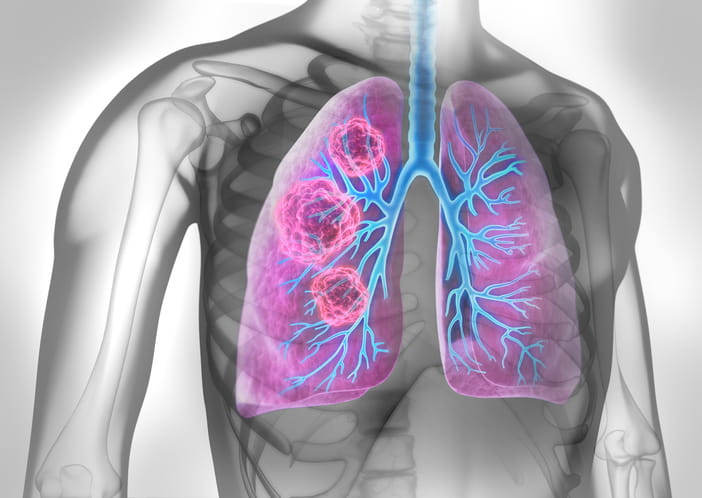
Lung cancer caused 127,070 of the 609,820 cancer deaths in the United States in 2023, making it the most deadly type of cancer in the U.S., responsible for one out of every five cancer deaths. Those with non-small cell lung cancer have a five-year survival rate of 28%. Early diagnosis increases the five-year survival rate to 60%.
Booking a lung cancer screening near your location and getting medical professionals to perform a comprehensive lung cancer screening can ensure you receive an early diagnosis or restore your peace of mind if you’re worried about getting lung cancer. Let’s examine what a preventative scan is, how often you should be screened for lung cancer, and what to expect from your lung cancer screening in Las Vegas.
Schedule your CT scan.
What Is Lung Cancer Screening?
A lung cancer screening is a health scan that looks inside your body to locate and identify abnormalities. Low-dose CT scans are powerful scanners capable of detecting tumors in their earliest stages of development, enabling those who get these preventative medical scans to receive the earliest possible diagnosis and prompt treatment.
Who Should Get Screened For Lung Cancer?
The following factors increase your risk of developing lung cancer:
- Smoking: Although a prolonged history of smoking increases the risks, anyone with a history of smoking is at risk of developing lung cancer.
- Regular exposure to second-hand smoke: Those who work where people smoke or who live with smokers have a higher risk of lung cancer.
- Family history: You have an increased risk of developing this disease if there’s a family history of lung cancer.
- Exposure to cancer-causing chemicals: Cancer-causing chemicals include arsenic, nickel, and radon.
- Air pollution: Regular exposure to heavy air pollution can increase your chances of getting lung cancer.
- Age: People over 55 years of age are more commonly diagnosed with lung cancer than people below that age.
How Often Should Lung Cancer Screenings Be Done?
Depending on your age and risk factors, you should schedule a preventative medical scan near your location annually. Those under 55 with no family history or history of smoking may be able to wait longer. Still, you should discuss this with your doctor to ensure you schedule your lung cancer screenings when appropriate.
Related: Who Needs Lung Cancer Screenings?
What Methods Are Used For Lung Cancer Screenings?
Diagnostic options for lung cancer include the following:
- Autofluorescence bronchoscopy (AFB)
- Endo-broncho ultrasound (EBUS)
- Narrow band imaging (NBI)
- Positron emission tomography/CT (PET/CT)
- White light bronchoscopy (WLB)
Low-dose CT scans are effective when scanning for lung cancer and reduce mortality rates by 20%.
Are There Any Risks Associated With Lung Cancer Screenings?
Low-dose CT scans deliver low levels of radiation exposure. The exposure is minimal, so the risk of complications is low.
A CT scan can produce a false positive, so follow-up tests are crucial to the diagnostic process.
What Should I Expect During A Lung Cancer Screening?
You need minimal preparation for a CT scan. Unlike some other medical tests, you do not need to do the following:
- Drink dyes
- Fast
- Take medication
Things you should do to prepare include:
- Avoid coffee for four hours before your scheduled scan
- Wear comfortable, loose-fitting clothing
- Wear clothes without underwire
- Be prepared to take your belt off
- Keep your pockets empty, or be ready to empty them when you have your scan
As long as you follow those guidelines, you won’t need to change when it’s time for your scan. Instead, you’ll lie down on the table. Once the ECG electrodes are placed on your body, the table slowly slides through the circular scanner. Sliding into a circular scanner enables the scanner to capture images of your body from all sides. You may be instructed to hold your breath once you’re inside the scanner. The CT technician will answer questions, ensure you’re prepared, and provide direction during scanning.
How Long Does Lung Cancer Screening Take?
The total time needed for a lung cancer screening is approximately 15 minutes or less. As long as you follow the directions and dress appropriately, the process is quick, enabling you to return to your regular activities without spending hours getting medical tests.
Completing the actual scan takes seconds.
Related: Lung Disease Cost
Can You Reduce The Risk Of Getting Lung Cancer?
Although you can’t do anything about a genetic predisposition, taking the following steps can reduce your risk of developing lung cancer:
- Avoid exposure to cancer-causing chemicals
- Avoid second-hand smoke
- Avoid stress
- Increase your intake of fruits and vegetables
- Quit smoking
- Start an exercise routine
- Take steps to prevent respiratory infections
While a healthy lifestyle can help lower the risks of getting lung cancer, the best way to ensure your peace of mind is to schedule a preventative medical scan. A health scan can confirm you’re healthy or detect potential problems early, ensuring you get essential medical care to restore your health.
Book your CT scan.
Sources:
Key Statistics for Lung Cancer. (2024).
Saleh, N. (2023). What Are the Deadliest Cancers?
Watson, S. (2024). Is Lung Cancer Genetic?
